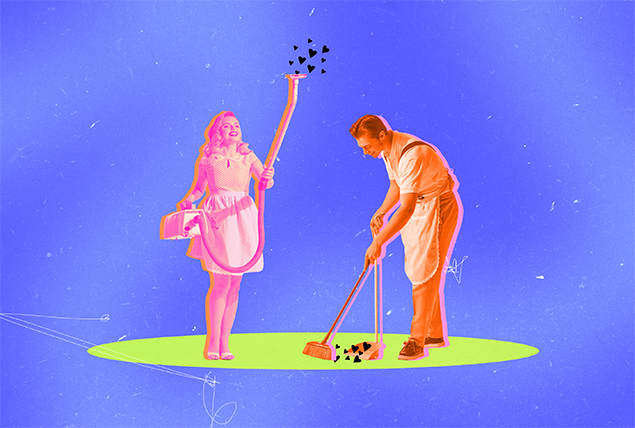Could a Gratitude Practice Improve Your Relationship?

Key Points
- Many couples begin to take each other for granted and notice the negative aspects of their relationship more than the positives.
- Research suggests gratitude affirmations can help to break these habits and heighten relationship satisfaction.
- Gratitude exercises can help improve the physical, mental and emotional health of those expressing their thanks.
In the initial googly-eyed stages of a relationship, when we're falling in love, most of us express our appreciation and affection freely, like guys with guitars offering covers of the Oasis hit "Wonderwall" at house parties.
But on the road from dating to marriage or life partnership, we may slip into routines and begin to take our partner and their efforts for granted, or at least neglect to express our love as often as we should.
While this can be a relationship death knell, research suggests adopting an attitude of gratitude can help you to rekindle a once-vibrant flame. Learn how you can be happier today, right now.
What is gratitude?
Gratitude is derived from the Latin word gratia, meaning grace, graciousness or gratefulness. Gratitude has two main parts, according to Robert Emmons, Ph.D., one of the world's leading scientific experts on gratitude.
- First, it's affirming there are good things in the world and how we've benefited from some of them, wrote Emmons in a 2010 essay for Greater Good Magazine, a publication of UC Berkeley.
- Second, being grateful acknowledges how some of the sources of goodness are outside of ourselves.
"We acknowledge how other people—or even higher powers, if you're of a spiritual mindset—gave us many gifts, big and small, to help us achieve the goodness in our lives," Emmons wrote.
The social aspect is vital to gratitude, and one of the reasons humans have evolved to experience and value it, suggested a 2010 report. Research indicates when people support and affirm us, we value them more.
Receiving these gifts can make us more inclined to reciprocate or pay it forward. In short, gratitude encourages cooperation and other prosocial behaviors.
"I see it as a relationship-strengthening emotion because it requires us to see how we've been supported and affirmed by others," Emmons wrote.
Can gratitude affirmations boost mental health?
People who consistently have an attitude of gratitude tend to be happier, indicated a 2003 report. Gratitude givers are more optimistic, less stressed and have higher life satisfaction.
According to a 2014 report, it may also help to alleviate depression and anxiety and aid in trauma recovery.
Moreover, because grateful people tend to have more and stronger social connections, research indicates they're typically less lonely and isolated.
"In addition to boosting serotonin—the happy hormone—gratitude is a way to focus our minds on everything that is or has gone right in our lives," said Charlynn Ruan, Ph.D., a clinical psychologist and founder of Thrive Psychology Group, who is based in the Los Angeles area.
With gratitude, optimism is sustainable and we can feel less anxious about uncertainty.
"Our brain has to filter out the majority of things that happen in our lives at any given time or we'd be overwhelmed with all the incoming information in the environment around us. Anxiety, stress and depression can cause us to selectively focus on negative things around us and make negative predictions for the future," Ruan said.
"Focusing on gratitude can cause us to filter out the negative and focus more on the positive, improving our mood and making us more likely to notice positive opportunities. Research shows how optimists and pessimists tend to get outcomes which match their expectations, so what we focus on matters," Ruan finished.
Recommended
- The Facts About Communication in Relationships: Good communication doesn't have to be hard and having a few techniques in your toolkit can make it a whole lot easier.
- The Link Between the Female Orgasm and Relationship Satisfaction: The orgasm gap isn't just attributable to a partner's performance in the bedroom.
- Is Heteropessimism Sabotaging Your Relationship?: Ingrained gender roles and societal expectations may cause some heterosexual women to feel depressed and unsatisfied in their relationships.
Gratitude can also improve physical health
Regular gratitude affirmations benefit physical well-being along with mental and emotional health, indicates research by Emmons and Michael McCullough, Ph.D..
Specifically, it may strengthen the immune system, shared a 2018 report. Gratitude can help reduce blood pressure and help us to feel less affected by aches, pains and other symptoms of illness.
Additionally, according to a 2009 study, feeling grateful can encourage health-promoting behaviors like exercise, a balanced diet and improved sleep.
"Gratitude is likely to increase positive chemicals in our body like serotonin and oxytocin and decrease chemicals like cortisol and adrenaline, which will help our nervous system be more regulated," Ruan said.
"This helps us to sleep better, crave healthier foods, feel more connected to those around us, and generally feel happier and healthier all around. Having a gratitude practice has incredible health benefits and can be the first step in a series of positive health behaviors to build upon each other," Ruan finished.
How can an attitude of gratitude strengthen relationships?
"Couples tend to stop 'seeing' each other over time. They don't notice all the little things that made the other person special at first because this is how the mind works. We look for novelty and are more alert to new things," said Jenn Kennedy, Ph.D., LMFT, founder of The Pleasure Project and Riviera Therapy, based in Santa Barbara, California.
"They tend to pull back into their individual lives and stop making time for their partner like they did in the beginning [of the relationship]. They also come to expect certain things, so they feel less surprise and gratitude. We become habituated to each other," Kennedy shared.
Intentional gratitude is essential in all types of relationships—especially romantic pairings—because it reminds us of what we love and appreciate about those most important to us, suggested a 2012 report.
In addition to improving overall relationship satisfaction, a 2023 review found couples who regularly practice gratitude have better sex lives, too.
"Expressing gratitude is an act of love which feels good for both the giver and receiver," Kennedy said.
Ruan added how it breeds goodwill and starts a "positive chain of events" by encouraging the recipient to reciprocate and their partner to continue showing their appreciation. The positive emotions this produces can fortify the relationship with grace to withstand future hurdles.
"Gratitude disrupts the habit of taking the good for granted while only noticing when things go wrong. It helps us to notice all the good. And when we notice the good, we feel better about our partner and are more loving towards them," Ruan said.
"If we express these positive things, our partner will feel appreciated and rewarded for those behaviors and will do more, which will in turn increase those behaviors, which will increase our positive feelings even more," Ruan added.
What's the best way to practice gratitude?
"Research suggests couples in healthy long-term relationships develop a culture of appreciation by consistently engaging in small, intentional acts to show their love and gratitude for one another," said Rachel Diamond, Ph.D., LMFT, a private practice therapist in Chicago.
There are several ways to do this, solo and with your partner. Here are five suggestions from the experts:
1. Make a plan
It's not easy to break old habits, including those which could be detrimental to your health and relationship, but making a plan can help, indicated a 2021 report.
"A plan encourages consistency, which is essential for adopting a new habit," Kennedy said.
Ruan added it also helps us use automatic thinking to our benefit by making it an automatic behavior.
"If we can make something a habit, we [remove] the extra cognitive work it takes to decide what to do each day, and it becomes part of our ritual, like brushing our teeth," Ruan said.
For example, you might plan to express at least one thing you appreciate about your partner every morning or night. Or you might set a reminder on your phone to stop and consider what you're grateful for each day, then communicate this with your significant other.
After about a month, these new habits will likely be part of your routine, and you'll begin to express thanks more spontaneously.
2. Practice gratitude meditation
Numerous studies have shown regular meditation's physical, mental and emotional health benefits. A 2017 review in Scientific Reports suggests gratitude meditation, specifically, could yield additional benefits.
Try a short evening meditation to reflect on things you're grateful for the day, recommended Aura De Los Santos, a clinical psychologist based in Santo Domingo, Dominican Republic.
Any convenient time of day will do.
If the idea of meditating sounds intimidating, try shorter guided meditations—available via various dedicated apps, YouTube.com or Mindful.org—to start.
3. Be creative
Although general statements like, "I'm grateful you're my partner," are nice, Ruan said they're not very inspiring or heartwarming.
Mixing things up and being specific can help your partner feel genuinely seen and appreciated.
"One of the best gratitude exercises is to always be on the lookout for positives," Diamond said. "It's easy to pinpoint aspects of your relationship that are frustrating or annoying, especially during stressful periods. But focusing on the good instead can be far more productive, particularly when you routinely share your positive feelings with your partner."
"The 3x3 gratitude practice is another method that's especially helpful for those who aren't very expressive," Ruan said. "This entails saying three things you like about your partner, three things you're proud of them for and three things you look forward to doing with them in the next week."
4. Make a gratitude jar or journal
"Gratitude journals are a great way to drop into this space," Kennedy said.
Make a gratitude list of three or more items at the start or end of the day. Write at length about one profoundly meaningful thing. These items don't all need to be about your partner, but you should include at least one item related to your relationship per day.
"You can also write letters of gratitude to your partner at anniversaries, on their birthdays or just because," Kennedy said.
Again, these are more meaningful when they're personal and specific.
"For example, 'I love the way you handled the kids' meltdown' is better than 'You are a great mom,'" she explained.
A gratitude jar is another option. Write gratitude affirmations on pieces of paper and then add them to a jar for your partner to open at the end of the day.
"These are great because they can be saved and reread on days when you are fighting or traveling and need a reminder of all the ways you are grateful for your partner and all the ways your partner loves you," Ruan said.
5. Remember, you're a team
"It isn't always easy to feel gratitude toward your partner if you think your efforts aren't fully appreciated," Kennedy said.
In these moments, remember you're a team, and sharing appreciation for them doesn't minimize the work you're putting in. This can be particularly important for parents, as the emotional labor of parenthood can feel overwhelming and invisible.
"I often find parents are hesitant to share appreciation because they're stuck in a battle of one-upping each other. For example, an exchange like this—'I'm so tired, I was up with the baby all night.' and the response, 'Yeah, well, I get up with him most nights,'" she said.
"I encourage them to instead lean into validating their partner's efforts as co-parents and partners. Engaging in gratitude practices of their partner does not invalidate or diminish their efforts. Instead, they will likely build a culture of appreciation in which both partners feel gratitude rather than resentment," Kennedy said.
The bottom line
Gratitude is a powerful emotion which, when expressed consistently, can provide social, physical, mental and emotional health benefits.
There's no "right" way to practice it, but regular gratitude exercises can help to make it a natural part of your and your partner's life—and improve your sex life in the process.


















